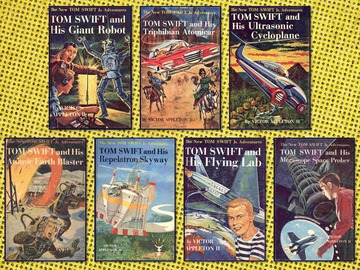A Tom Swifty is a play on words taking the form of a quotation ascribed to Tom and followed by an adverb. Here's a good example:
"The thermostat is set too high," said Tom heatedly.
The term was coined by Willard Espy (1911–99), one of the masters of word play, who compiled two wonderful collections of poems, essays, quizzes, and other writings about language: An Almanac of Words at Play (1975) and Another Almanac of Words at Play (1980). Merriam-Webster was fortunate to acquire the rights to these books and published excerpts from them in a collection entitled The Best of an Almanac of Words at Play in 1999.
Droll humor is a feature of much of the material Espy collected, as is apparent in the Almanac entry for Tom Swifties. The form takes its name from the main character in a series of adventure books published by Edward Stratemeyer beginning in 1910. (Although the books were all credited to "Victor Appleton," he was imaginary – the books were actually written by several different authors.) In the series, which had titles that included Tom Swift in the City of Gold, Tom Swift and His Wizard Camera, and Tom Swift and His Great Searchlight, the authors supposedly revealed a weakness for adverbs, attaching an excess of them to dialogue in order to add color and variety to the narration.
Sometimes the puns are simple:
"Let's gather up the rope," said Tom coyly.
"Welcome to my tomb," said Tom cryptically.
"I can't find the oranges," said Tom fruitlessly.
Sometimes they require a little more thought to get:
"Don't you love sleeping outdoors," Tom said intently.
"Let's trap that sick bird," Tom said illegally.
"I lost my trousers," said Tom expansively.
And some are inspired:
"I just ran over my father," Tom said transparently.
And the all-time best Tom Swifty:
"I just dropped the toothpaste," said Tom crestfallenly.
Tom Swifties seem to have fallen into disuse in recent years – they're overdue for a revival. If nothing else, they're fun and they'll help keep your mind sharp. That's what we say, pointedly.





